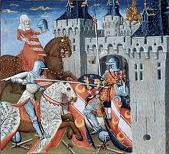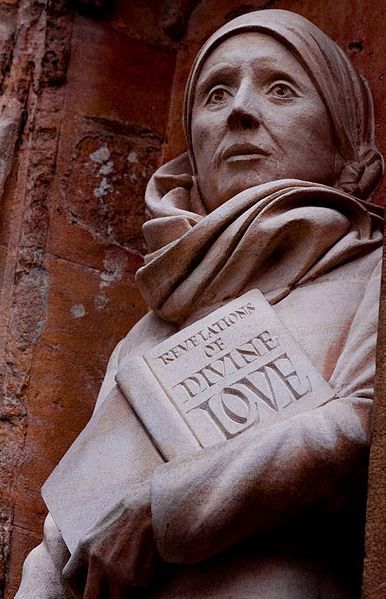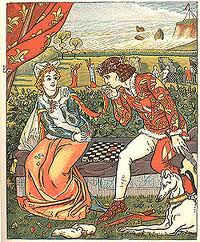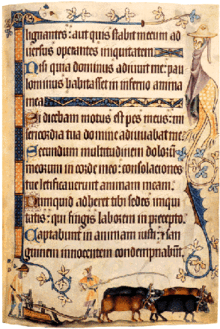Impregnable friendship : locating desire in the middle English ‘Amis and Amiloun’
Scholarship on Amis and Amiloun has generally been divided into two critical schools. The majority of critics have read the work as an exemplar of perfect friendship, overlooking (or ignoring) any trace of homoeroticism, citing the possibility itself as anachronistic, or explaining away its presence by offering historical or theoretical justification for intimacy among medieval men.
Listening for the Vikings: Some Evidence from Etymology
The Vikings left behind several kinds of evidence during their stay in Anglo-Saxon England. Richard Dance notes that ‘one crucial aspect is the etymological.’
‘Fromm thennes faste he gan avyse/This litel spot of erthe’: GIS and the General Prologue
This paper was given at the Canada Chaucer Seminar on April 27, 2013.
Pleasurable Forms and Forms of Pleasure in the Pages of the Pearl – manuscript
Bahr discussed the poem, Pearl, jokingly termed, ‘a formalists wet dream’, and focused on its implied relationship between pleasure and form and how it explored the relationship between desire and fruitfulness.
The Seven Deadly Sins: Some Problems of Research
In the following pages, I should like to point out a number of aspects or areas which my own study of acedia has convinced me must and can be fruitfully explored.The account does not aim at comprehensiveness; certainly, other students of mediaeval thought and literature will be able to point out other desiderata. If it merely revives some interest in its subject, it will have fulfilled its purpose.
Medieval Astrology and The Buke of the Sevyne Sagis
It is useful to begin by comparing the way the sages are initially described to the Emperor in the Latin, Middle English, and Middle Scots texts. Although the Middle Scots text is not connected to the English ones, they serve as a useful backdrop to illustrate the singular nature of the Scottish version of the story.
The Legend of the Purgatory of Saint Patrick: From Ireland to Dante and Beyond
“Yes by Saint Patrick …. Touching this vision here It is an honest ghost, that let me tell you” (Hamlet, Act I, Scene 5)
Mi Suete Leuedi, Her Mi Béne: The Power and Patronage of the Heroine in Middle English Romance
The Middle English Romances are somewhat difficult to study as a group. In order to examine these works accurately, one must take into consideration other literature produced at the same tirne, as well as that which preceded it.
The Scandinavian element beyond the Danelaw
The present paper concentrates on the Scandinavian element present in Eng- lish in the area beyond the Danelaw, i.e. in the West Midlands and Southern parts of the country.
The Cross as Tree: The Wood-of-the-Cross Legends in Middle English and Latin Texts in Medieval England
The wood-of-the-cross legend is actually a group of narratives that trace the pre- history of the wood used to make Christ’s cross back to Old Testament figures, or in some cases back to paradise itself.
Reading “The Revelations of Elizabeth of Hungary” as a Devotional Text
In this thesis I would like to move beyond the discussions of authorship for The Revelations and begin to examine the text itself. In fact, I neither attempt to question the arguments for Elizabeth of Töss’s role as the visionary in the text, nor do I deny that someone in the community acquainted with Elizabeth, either first-hand or close to it, wrote her visions down.
Rhetorics of Pain and Desire: The Writings of the Middle English Mystics
This dissertation “Rhetorics of Pain and Desire: The Writings of the Middle English Mystics,” seeks to explore the connections between desire and pain in the writings of Richard Rolle, Julian of Norwich, Margery Kempe and Walter Hilton. All four writers develop a rhetoric that allows them to use pain and/or desire as a catalyst through which their writing becomes embodied.
Threads of resistance to the post-conquest Kings of Norman Descent
Produced almost 250 years after first contact with the Norman colonizer, the exclusive use of Middle English was a subversive choice that challenged the Norman claim to power and criticized the post-Conquest kings of Norman descent while working to re-make and re-claim an ‘English’ identity.
“My trouthe for to holde—allas, allas!”: Dorigen and Honor in “The Franklin’s Tale”
We can see from the beginning of the Franklin’s Tale that honor as pub- lic esteem is an overriding concern for Arveragus, who qualifies his exceedingly courtly marriage vow, swearing always to remain Dorigen’s servant in love, with the condition that he retain the public appearance of lordly husband, “That wolde he have for shame of his degree”.
Medieval Book History Week Lecture: “Practical Latin and Formal English in the 14th-15th Centuries”
This lecture is part of Medieval Book History Week. Renown Professor Jeremy Catto spoke about literacy and language in England during the later Middle Ages at the Pontifical Institute of Mediaeval Studies at the University of Toronto.
Authors, Scribes, Patrons and Books
This essay gives an account of the social role of manuscripts and early printed books and the processes by which they were made, processes that changed greatly during the period
Chaucer’s costume rhetoric in his portrait of the Prioress
No critic has ever discussed costume signs in order to reveal to what extent the Prioress does or does not conform in her costume to the fourteenth century norm, with consideration given, simultaneously, to the historical records, literature and visual arts of the period that form and inform the signs from the many traditions Chaucer in corporates in his portrait of the Prioress.
Historical imagination in/and literary consciousness: The afterlife of the Anglo-Saxons in Middle English literature
The long-held belief that the Norman Conquest represented a cultural apocalypse has been challenged by scholars who have emphasized continuity and gradual change as opposed to the agonistic model that formerly placed a crisp border between the AngloSaxon period and the arrival of the Normans.
The Reference Corpus of Late Middle English Scientific Prose
This paper presents the current status of the project Reference Corpus of Late Middle English Scientific Prose, which pursues the digital editing of hitherto unedited scientific, particularly medical, manuscripts in late Middle English, as well as the compilation of an annotated corpus
Treason and Betrayal in the Middle English Romances of Sir Gawain
This article explores the themes of treason and betrayal which are common motifs of medieval romances, specifically those featuring the Arthurian knight Sir Gawain.
The Virtuous Pagan in Middle English Literature
From the first through the fourteenth centuries, a succession of solutions to the problem of these virtuous pagans evolved. For the Early Church, an attractive solution was that Christ descended into Hell to convert the souls he found there.
The True Characters of Criseyde and of Diomede in Chaucer’s Troilus and Criseyde: A Restoration of the Reputations of Two Misunderstood Characters Unjustly Maligned in Literary Criticism
This is a defence of the characters of Criseyde and of Diomede based, inter alia, on a close textual analysis.
Christian Cato: A Middle English Translation of the Disticha Catonis
It is possible that this translation is the result of an exercise by a not very gifted schoolboy.
The Use of the Rhetorical Exordium in Middle English Drama
In this paper I wish to single out one group of Middle English writings, the mediaeval drama, to examine more closely the interesting applications of the doctrine as exhibited in the “banns” of the miracle plays and of certain moralities, and in the traditional prologues, but es pecially in the more “organic” solutions arrived at by the authors of Man kind and Everyman.
The Evolution Of English
A video lecture on the origin and vagaries of the English language up to the 15th century














